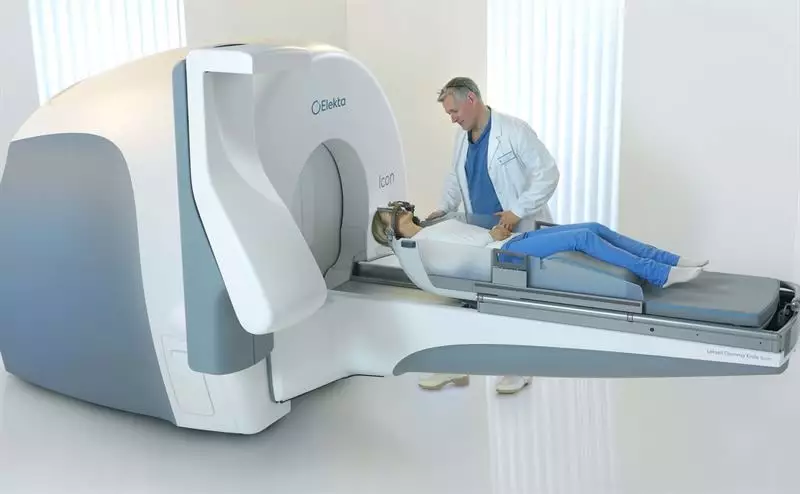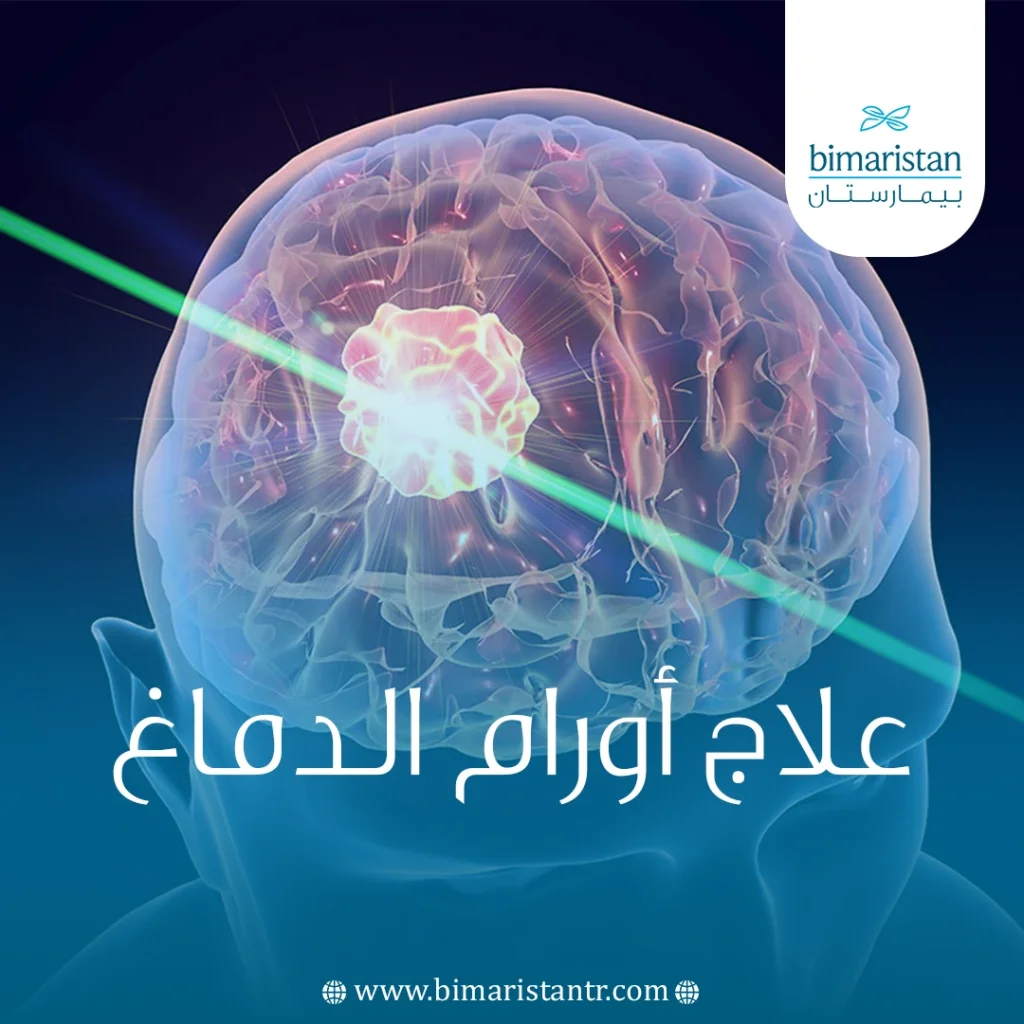تعتبر تركيا مركزا طبيا عالميا لعلاج أورام الدماغ و التي يشرف عليها أطباء و أخصائيون دو كفاءة عالية, وهدا نظرا لخطورتها و المضاعفات الصحية المترتبة عنها. سنتعرف في هدا المقال عن أهم طرق علاج أورام الدماغ في تركيا.

كيف يتم تشخيص أورام الدماغ؟
إذا كانت لديك أعراض و اشتُبه في أنك مصاب بورمٍ في الدماغ، فقد يوصي الدكتور الخاص بك بإجراء عدد من الاختبارات والإجراءات، وهي:
- فحص عَصَبي.قد يشمل اختبار البصر، والسمع والتوازن، والتنسيق، وردود الفعل المنعكسة إلى جانب فحوصات أخرى. وجود مشكلات في أحد هذه المناطق تعد مؤشرات عن المنطقة التي تأثَّرت بالورم في الدماغ.
- اختبارات التصوير. يساعد التصوير بالرنين المغناطيسي (MRI) على الكشف عن ورم الدماغ.
- فحوصات للكشف عن وجود أورام أو سرطان في مناطق أخرى من الجسم. قد يوصي الطبيب بالقيام باختبارات وعمليات لتحديد موضع الورم. على سبيل المثال، استخدام التصوير المقطعي المحوسب أو التصوير المقطعي بالإصدار البوزيتروني (PET) للكشف عن علامات الإصابة بسرطان الرئة.
- جمع عينة من نسيج غير طبيعي من الورم وفحصها (خزعة).
ما هي مراحل نمو الأورام في المخ؟ (درجات سرطان الدماغ)
- المرحلة الأولى – ورم المخ الحميد.
- المرحلة الثانية – ورم المخ الخبيث.
- المرحلة الثالثة – ورم المخ الخبيث مع أنسجة تبدو غير طبيعية للغاية وتنمو بنشاط (متحشمة).
- المرحلة الرابعة (المرحلة الأخيرة) – يحتوي النسيج الخبيث على أنسجة تبدو غير طبيعية وتميل إلى النمو بسرعة.
علاج أورام الدماغ brain tumors treatment
الخيارات المقترحة لعلاج أورام الدماغ هي ثلاثة أنواع من العلاجات: طريقة العلاج بواسطة جراحة المخ والعلاج الإشعاعي والعلاج الكيميائي.
يعتمد اختيار علاج فعال على:
- نوع ودرجة ورم الدماغ وموقعه وحجمه
- عمر المريض و وصحته العامة
يمكن للطبيب أن يصف النتائج المتوقعة والآثار الجانبية المحتملة لعلاج الأورام في الدماغ. نظرًا لأنها غالبًا ما تضر بالأنسجة السليمة ، فقبل بدء علاج أورام المخ، يمكنك سؤال طبيبك الخاص بك عن أعراض جانبية محتملة بعد العلاج وكيف يمكنها أن تغير أنشطتك الطبيعية. و هذا سيساعده في وضع خطة علاجية تلبي احتياجاتك الطبية والشخصية.
يشمل الأطباء المتخصصين في علاج أورام الدماغ: أطباء وجراحي الأعصاب وأطباء الأورام العصبية وأخصائيي علاج أورام الدماغ بالأشعة وأخصائيي الأشعة العصبية. كما قد يشمل العلاج أيضًا ممرضة أورام ، وأخصائي تغذية ، ومستشارًا للصحة العقلية ، وأخصائيًا اجتماعيًا ، ومعالجًا فيزيائيًا ، ومعالجًا مهنيًا ، ومعالجًا للنطق ، وأخصائيًا في الطب الطبيعي.
علاج أورام الدماغ بالجراحة
تعتبر الجراحة الاقتراح الأول المعتاد لعلاج معظم الأورام الخاصة بالدماغ. جراحة الأورام في الدماغ بفتح الجمجمة تسمى حج القحف. يقوم فيها الجراح بعمل شق في مكان الورم في الرأس. و من الممكن أن ينزع الطبيب جزء أو كل ورم الدماغ و أنت مستيقظا . قد يُطلب منك تحريك ساق ، أو العد ، أو قول الأبجدية ، أو سرد قصة. تساعد قدرتك على اتباع هذه الأوامر الطبيب على حماية أجزاء مهمة من الدماغ.
في بعض الأحيان يصبح العلاج الجراحي باستأصال اورام اﻟﺪﻣﺎغ غير ممكن. إذا كان الورم الدماغي في جذع الدماغ أو مناطق أخرى معينة من الدماغ، قد لا يتمكن الجراح من إزالته دون الإضرار بأنسجة الدماغ الطبيعية.
و في بعض الأحيان، يكون العلاج بإجراء خزعة باستعمال إبرة. حيث يستخدم الطبيب في هده العملية إطار رأس خاص يشبه الهالة, يقوم بالمسح بالأشعة المقطعية أو التصوير بالرنين المغناطيسي لتحديد موقع الورم بدقة. ثم يعمل ثقب صغير في الجمجمة ثم يوجه إبرة إلى الورم. يسمى استخدام هذه التقنية في العلاج يإجراء خزعة أو العلاج التجسيمي.
هناك تقنيات علاجية متقدمة أخرى و المستخدمة أثناء عملية استأصال أورام الدماغ, تعتمد على رسم خرائط في الدماغ ، والتنظير الداخلي بالقرب من الأورام لإجراء الخزعات وفتح مسارات السوائل الشوكية من خلال نطاق صغير واستئصال الأورام المجسمة بمساعدة الكمبيوتر.
يختلف الوقت المستغرق للشفاء بعد العلاج و استئصال الأورام حسب الحالة الصحية و الجهاز المناعي لكل شخص. و من المحتمل أن يشعر المريض بالتعب أو الضعف أو الصداع في الأيام القليلة الأولى بعد علاج الورم.
قد تضر عملية الاستئصال للورم من الدماغ بالأنسجة الطبيعية. مما قد يسبب مشاكل في التفكير أو الرؤية أو التحدث. يمكن أن يسبب أيضًا تغيرات في الشخصية. معظم هذه المشاكل تقل أو تختفي مع مرور الوقت. لكن في بعض الأحيان يكون الضرر الذي يلحقه نزع الورم من الدماغ دائمًا. و قد يحتاج المريض لعلاج الطبيعي أو علاج النطق أو علاج مهني.
علاج أورام الدماغ بالأشعة
يعمل علاج أورام الدماغ بالإشعاع على قتل خلايا أورام الدماغ بالأشعة السينية عالية الطاقة أو أشعة الجاما gamma أو البروتونات. و في بعض الأحيان ، يخضع المرضى الذين لا يتحملون الجراحة الطبية لاستئصال الأورام للعلاج الشعاعي بدلاً من ذلك.
يستخدم الأخصائيون أنواعًا خارجية وداخلية منه لعلاج أورام الدماغ:
-
العلاج بواسطة اﻹشعاع الخارجي للدماغ :
تقوم آلة كبيرة خارج الجسم بتوجيه حزم من الإشعاع إما إلى الدماغ بالكامل أو أجزاء معينة من الدماغ. يحتاج بعض الناس إلى إشعاع موجه إلى النخاع الشوكي أيضًا. يُعد علاج ورم المخ بالأشعة الخارجية المجزأة ، التي تعطى بجرعات صغيرة أو كسور من الإشعاعً مرة واحدة يوميًا ، وهي الطريقة الأكثر شيوعًا عند المرضى المصابين بأورام الدماغ.
يساعد علاج الأورام التي تصيب الدماغ بإعطاء جرعة كاملة من الأشعة على مدى أسابيع على حماية المناطق السليمة في المخ. تستغرق الزيارة النموذجية أقل من ساعة ، ويستغرق كل علاج بضع دقائق فقط.
تدرس بعض المراكز الطبية طرقًا أخرى لعلاج أورام المخ بالأشعة الخارجية:
- علاج الأورام بواسطة الأشعة المعدلة الكثافة أو ثلاثي الأبعاد: تستخدم فيها أجهزة الكمبيوتر لاستهداف الأورام عن كثب لتقليل الضرر الذي يلحق بالأنسجة السليمة.
- علاج الأورام بواسطة الأشعة بحزمة البروتون: مصدر الأشعة هو البروتونات وليس الأشعة السينية. يوجه الطبيب شعاع البروتون نحو الورم. بحيث تعطى الجرعة على المنطقة الطبيعية من حزمة البروتون أقل من جرعة شعاع الأشعة السينية.
- علاج الأورام باﻹشعاع التجسيمي: يتم توجيه حزم ضيقة من الأشعة السينية أو أشعة جاما إلى الورم من زوايا مختلفة. في هذا الإجراء ، ترتدي إطار رأس صلبًا. يمكن إعطاءه خلال زيارة واحدة أو خلال عدة زيارات.

-
العلاج بواسطة الاشعاع الداخلي (العلاج الاشعاعي بالزراعة أو المعالجة الكثبية):
لا يُستخدم هدا النوع من العلاج بصفة شائعة في أورام المخ وهو قيد الدراسة. تأتي الأشعة من مادة مشعة موجودة في غرسات صغيرة جدًا تسمى البذور. توضع البذور داخل الدماغ وتطلق إشعاعًا نحو الورم تنتشر الأشعة فيه لعدة أشهر.
بعض الناس ليس لديهم آثار جانبية أو لديهم آثار جانبية قليلة بعد علاج أورام الدماغ. في حالات نادرة ، قد يصاب المريض بالغثيان و الشعور بالتعب الشديد بعد كل علاج إشعاعي موجه نحو الورم. الراحة مهمة ، لكن غالبا ما ينصح الفريق الطبي مرضاهم بمحاولة البقاء نشيطين قدر الإمكان.
أيضًا ، عادةً ما يتسبب علاج أورام المخ بالأشعة الخارجية في تساقط الشعر من الجزء الذي تمت معالجته. ينمو الشعر مرة أخرى في غضون بضعة أشهر. قد يصبح جلد فروة الرأس والأذنين أحمر وجافًا ومؤلمًا. و يمكن للطبيب اقتراح طرق لتخفيف وعلاج هذه الأعراض.
أحيانًا يتسبب علاج سرطان المخ بالأشعة في تضخم الأنسجة الموجودة في الورم كما قد أنه أحيانا يؤدي الى قتل أنسجة المخ السليمة . قد تصاب بصداع أو تشعر بالضغط. و يمكن تقليل دلك بتناول الأدوية.
علاج الأورام بالأشعة قد يضربالغدة النخامية ومناطق أخرى من الدماغ. بالنسبة للأطفال ، يمكن أن يتسبب هذا الضرر صعوبة في التعلم أو إبطاء النمو والتطور. زيادة إلى ذلك ، فهي تزيد من خطر الإصابة بالأورام الثانوية في وقت لاحق من الحياة.
العلاج الكيماوي لأورام الدماغ
عادة ما يعالج الأطباء بعض أورام الدماغ باستخدام الأدوية لقتل الخلايا السرطانية. يمكن إعطاء الأدوية بالطرق التالية:
- العلاج عن طريق الفم أو الوريد (عن طريق الوريد): يمكن إعطاء العلاج الكيميائي أثناء العلاج بالأشعة وبعده. تدخل الأدوية مجرى الدموتنتقل في جميع أنحاء الجسم. يمكن إعطاؤهم في العيادة الخارجية بالمستشفى أو في عيادة الطبيب أو في المنزل. نادرًا ما تحتاج إلى البقاء في المستشفى. تعتمد الآثار الجانبية للعلاج الكيميائي بصفة أساسية على الأدوية التي تم تناولها ومقدارها. تشمل الآثار الجانبية الشائعة القيء وفقدان الشهية والصداع والحمى والقشعريرة والضعف. وتخفيف بعض هده الآثار الجانبية يكون بتناول بالدواء.
- العلاج بواسطة الرقائق التي توضع في الدماغ: بالنسبة لبعض البالغين المصابين بورم دبقي عالي الدرجة ، تزرع عدة رقائق في الدماغ. كل رقاقة بحجم عشرة سنتات تقريبًا. على مدى عدة أسابيع ، تذوب الرقائق ، وتطلق الدواء في الدماغ.
علاج أورام الدماغ في تركيا
تستقطب تركيا سنويا الالاف من المرضى حول العالم خاصة من دول الشرق الأوسط وشمال افريقيا ودول وسط أسيا و أوربا, نظرا لاعتماد المستشفيات فيها على أحدث تقنيات الطب و مدى استحسان التكلفة العلاجية بها, و هي تعتبر مركزا طبيا اقليميا للسياحة العلاجية و علاج الحالات المستعصية منها أورام و سرطان المخ و الأمراض المستعصية الأخرى.
مركز بيمارستان الطبي خيارك الأول للعلاج في تركيا.نوجهك لأفضل الاختصاصين الخبراء بكافة المجالات، نساعدك على التواصل مع طبيبك، و حجز الموعد بأهم وأحدث مراكز العلاج في تركيا ، نقدم خدماتنا لتأمين حجز فندقي لك و لمرافقيك إضافة للمواصلات للتنقل، نساعدك في تأمين تأشيرة السفر لك مجاناً.نرافقك على مدار 24 ساعة خطوة بخطوة نحو الشفاء.
لذا في حال رغبتك بأخد اسشتارة حول حالتك الصحية و امكانية معالجتها و طلب سعر الخدمة، يمكنك ارسال التقارير الطبية الخاصة بك ووصف الحالة لأطباء بيمارستان من هنا.
